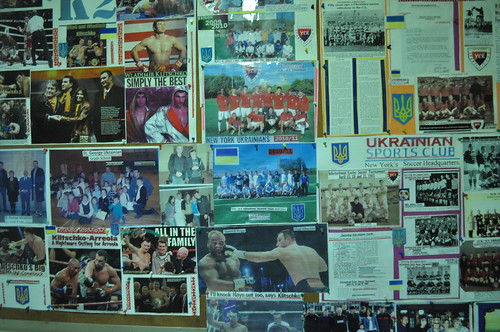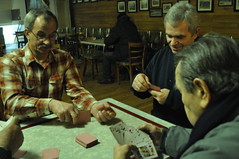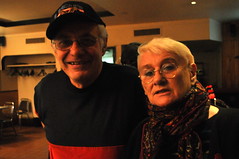 Meredith Hoffman The Ukrainian Sports Club, a hub for emigres for four decades, is set to close soon. Citing a membership of 20 people, club organizers say that it can no longer continue with an $80,000 annual property tax bill and the $25,000 per year cost of insurance.
Meredith Hoffman The Ukrainian Sports Club, a hub for emigres for four decades, is set to close soon. Citing a membership of 20 people, club organizers say that it can no longer continue with an $80,000 annual property tax bill and the $25,000 per year cost of insurance.From his barstool at the Ukrainian Sports Club, Ozzy Verbitsky yelled a message to his fellow Ukrainian-Americans on a recent evening, “There’s no more club anymore! We’re finished!” Then he shook his head mournfully and turned back to the bar.
Though other members wore less visible despair, most turned glum at the mention of the club’s future. The space on Second Avenue near Seventh Street, which has been owned and occupied by the “Ukrainian sports fraternity” since 1972, was put on the rental market last week, due to the club’s financial struggle. Already, 15 interested businesses have responded, said real estate broker Gary Rubinstein.
“This is a unique opportunity because of size and location,” said Mr. Rubinstein, who listed the price for the 3,150-square-foot ground floor space at $26,500 per month. “A major change is coming to the building.”
That change will leave old-timers like John Kowal, 85, and recent immigrants like Jerry Gritsik, 57, searching for a new spot to play cards each night.
In a vast room covered with soccer photos and old trophies, Mr. Kowal looked up from his four-person game but continued to grip his cards as he spoke.
“The old timers die, there are very few people left,” said Mr. Kowal, who was around at the club’s founding and during its soccer championship in the U.S. Open Cup in 1965. “But so far we still exist.”
Mr. Gritsik, a new member who moved from Ukraine four months ago, said the club is a way for him to continue connecting with people from his homeland.
The members, though passionate, are dwindling in numbers, with only 20 these days compared to hundreds back in the 70’s. Mr. Verbitsky, the club’s vice president, attributed that decline to the way that Ukrainians have “dispersed” and moved to places like Brighton Beach.
Mr. Verbitsky also explained the club’s insurmountable bills, including $80,000 in yearly property tax and $25,000 per year in insurance. On top of that, a fire in June warranted another $250,000 in repairs, said the club’s president, Willy Zenkewitsch.
“This is not what I wanted to inherit,” said Mr. Zenkewitsch, ending his first year as president. But he explained that renting the space was the only way to keep at least the club’s “name in the community.”
Long before the name East Village was adopted, the area along Second Avenue between East Sixth Street and East 10th Street was known as Little Ukraine. Some estimates put the post-World War II population at more than 60,000 and it thrived through the 1990’s.
It was then that the buildings department approved plans for the 25,000 square-foot Ukrainian Museum on East Sixth Street, not far from the block of East Seventh Street where the St. George Ukrainian Catholic Church provided an anchor to an immigrant community. In more recent years, however, the Ukrainian presence in the East Village has been shrinking. For instance, in 2000, Kiev, a 24-hour restaurant and longtime neighborhood staple closed its doors for good.
The sports club receives money from its three upstairs apartments, but a rent control rule keeps the prices for the residential tenants unusually low. Each of the three 2,300-square-foot lofts cost $700 per month, said Mr. Zenkewitsch. Meanwhile, the club only charges its members $15 annual fees.
“If we raised the fees we’d lose half our members” Mr. Zenkewitsch said. “They’re already set in their own ways.”
The members, however, depend on the space. Among them is Luba Firchuk, who comes to the bar every evening after work at her East Village boutique.
“It’s the cheapest place in town to have a drink,” she said, blue eye shadow shimmering as she sipped a cranberry, orange juice vodka. After 15 years as a member, she said she has “no idea” where she’d go without the club.
“It’ll be a shame to lose it — but that’s the sign of the times, I suppose,” she said, matter-of-factly. If she could maintain a connection to her native culture, she said, she certainly will continue to do so — even if she has to go somewhere else for drinks.
This post has been changed to correct errors; an earlier version mispelled the surnames of Mr. Rubinstein and Mr. Zenkewitsch and misstated the rental price for the property. Changes were also made to Mr. Verbitsky’s first name and additional details have been included about the construction of the Ukrainian Museum.





